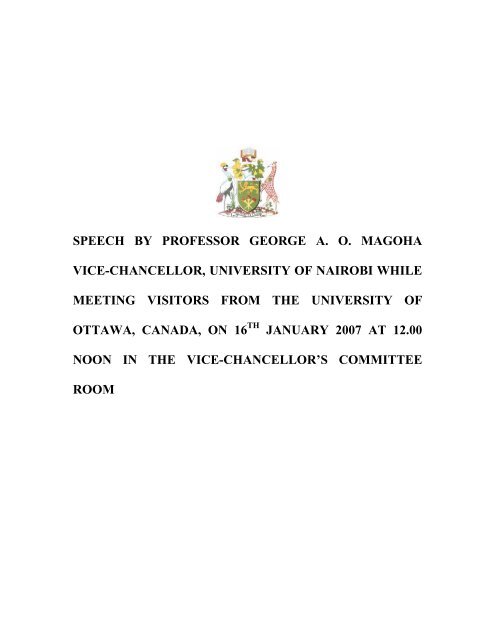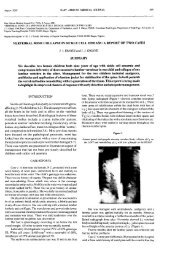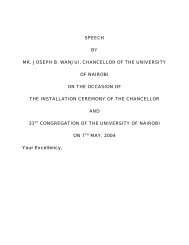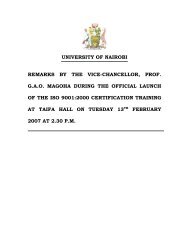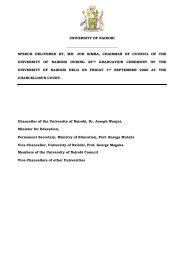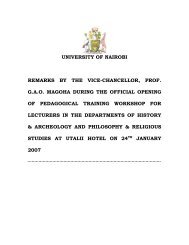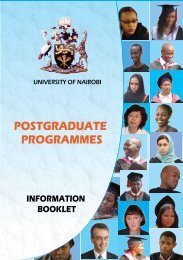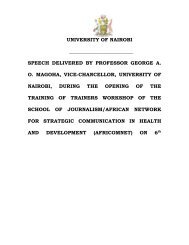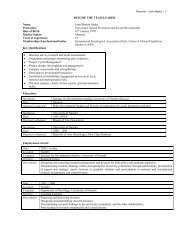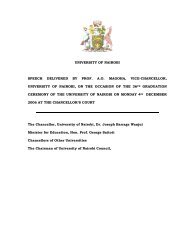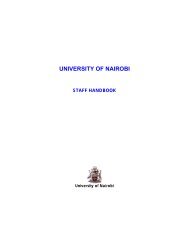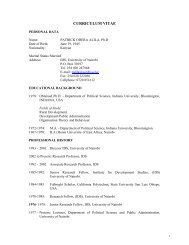speech by professor george ao magoha vice-chancellor, university ...
speech by professor george ao magoha vice-chancellor, university ...
speech by professor george ao magoha vice-chancellor, university ...
Create successful ePaper yourself
Turn your PDF publications into a flip-book with our unique Google optimized e-Paper software.
CARL Country Report – United KingdomFinalJuly 2006Peter Simmons, Karen Bickerstaff and John WallsCentre for Environmental RiskSchool of Environmental SciencesUniversity of East AngliaNorwich NR4 7TJUnited Kingdom
3Professor Jamie Benedickson, Co-director of IUCN Academyof Environmental LawOur Visitors in his team from University of OttawaDeputy Vice-Chancellor (A&F)Principal, College of Humanities & Social SciencesDean, School of LawDirector, IDSCoordinator, CASELAPChairman, Department of Public LawProf. Patricia Kaneri-Mbote
4I welcome you all to University of Nairobi and to the Republic ofKenya.You have come to us as pioneers and on a fact-finding missionaimed at building a foundation for collaboration between thisUniversity and your own. The team you are meeting and othersyou will meet during the week are aware that you come here onlypartly as representatives of University of Ottawa. The biggerpicture is that you have come as agents of the IUCN Academy ofEnvironmental Law.
5We have followed very closely the arrangements towards this visitsince May 2006 Inaugural Meeting of the Governing Council ofthe Academy. We understand it that activities of the Academywere taken very seriously at all levels of academic andadministrative management of University of Ottawa.Weunderstand it that the management of your University was fullysupportive of inter-<strong>university</strong> collaboration as one of the avenuesfor promoting excellence in scholarship, which is one of theobjectives of the IUCN Academy of Environmental Law.
6There is certainly a significant sign of support for the Academythan that University of Ottawa resolved to host the Academygiving financial infrastructural and inspirational support to itsaspirations.I want to stress the historical fact that University of Nairobi wasonly second to Shanghai University <strong>by</strong> declaring support for theAcademy and its activities. In the initial stages when theaspirations of the Academy were still only abstract concepts in
7the minds of Professor Nicholas Robinson of Pace University andhis colleagues, this University resolved to concretize the concept<strong>by</strong> hosting the Second Colloquium of the Academy here inNairobi. About 90 academics, administrators and students of theUniversity volunteered to organize the largest event in academiccalendar that year, in the continent. We are keen to hear fromthose who attended that colloquium if there has been a betterorganization either at Macquarie University in Sydney or PaceUniversity in New York. In other words we were happy andproud to be associated with the efforts to launch one of the most
8respectable learned societies in the world. I believe thatUniversity of Ottawa is even more proud, actually hosting therespectable and unique Academy.It must therefore be a shared sense of delight and courage thatour two universities take on the challenge of pioneering inter<strong>university</strong>collaboration to promote objectives of IUCN Academyof Environmental Law.
9We accepted the challenge of international scholarlycollaboration with University of Ottawa because the proposalfalls squarely within our vision. It is our vision to be “A WorldClass University committed to academic excellence andtransformation of the lives of Kenyans and serving society withdistinction”.Underlying this vision is the inevitable axiom that we aredetermined to engage in collaboration with like-mindeduniversities worldwide so that our scholars can dynamically
10compare their standards with scholars in comparable institutions.Just like scholars engage in dialogue virtually, and throughpublished works, we encourage our scholars to engage personallythrough joint research, joint supervision of students as well as indistance teaching. I submit to you that a world-class status is notsomething one professes while in a secluded academic ghetto.Our borders must be constantly opened for interaction andengagement, which enables our scholars to constantly comparetheir levels of scholarly performance with partner institutions.
11As you travel from Ottawa, Canada to Nairobi to explore avenuesfor collaboration, I trust that with our colleagues, you will befocused. Keep in mind that the IUCN Academy and its objectivesis known worldwide. Your colleagues worldwide will be listeningto hear if you are, indeed concretizing the aspirations of theAcademy. If, as we agree, the Second Colloquium held here wasa success, my office will not agree that the collaboration initiatedhere should fail. Therefore, I challenge you to workout a seriousmemorandum of understanding, which can field concrete andmeasurable results. I challenge you to present to my office an
12acceptable memorandum for signature within the next six weeks.It goes without saying that the Academy and University ofOttawa world not have invested quality time and resource forseven people to come to Nairobi for two weeks if they were notclear on objectives. Under these circumstances procrastinationwould be counter productive and valueless. This University willnot accept such an eventuality.I want both sides to keep in mind that collaboration inscholarship thrives in mutual respect. I have stated already that
13scholarship depends on University of standards. Neither Nairobinor Ottawa nurtures ghetto scholarship. You must constantlykeep it in mind that collaboration is not only for comparability ofstandards; it must also promote mutually recognized excellence.It is for that reason I go back to the Second Colloquium of theAcademy in 2004. Out of the forty papers from that Colloquium,which were published in the book on Land Use for SustainableDevelopment, <strong>by</strong> Cambridge University Press, 2007, four paperswere <strong>by</strong> Kenyan scholars. Remember first, that there were more
14presentations, than four. The book could only include so manyfrom Kenyans. There were eleven from other African scholars.I want to firmly congratulate those who organized the successfulcolloquium and those who presented papers, which nowconstitute the book. I will be glad now to present the book to thecontributors. In that way we applaud and encourage the work ofthe Academy.
15Your programme will be crowded and I may not meet with youbefore your return to Ottawa. I trust that you will have a finalget together with my colleagues under chair of the Principal ofthe College of Humanities and Social Sciences. Do convey mypersonal gratitude to the President of your University and yourcolleagues and say I look forward to making their personalacquaintances here in Nairobi or in Ottawa. Please reservespecial appreciation for Professor Nicholas Robinson and theentire Governing Council for the initiatives in steering the IUCNAcademy of |environmental Law.
Thank you16


